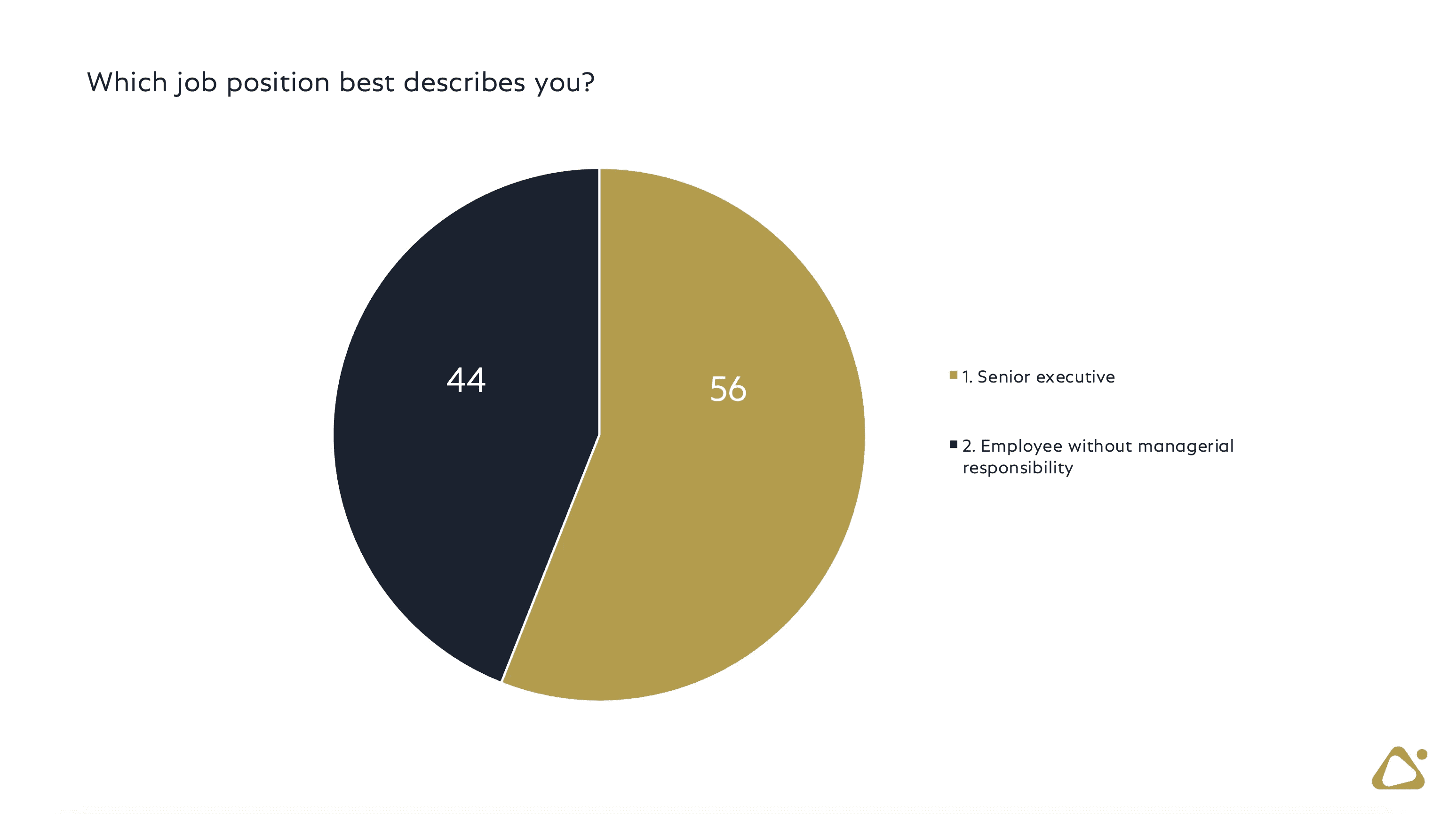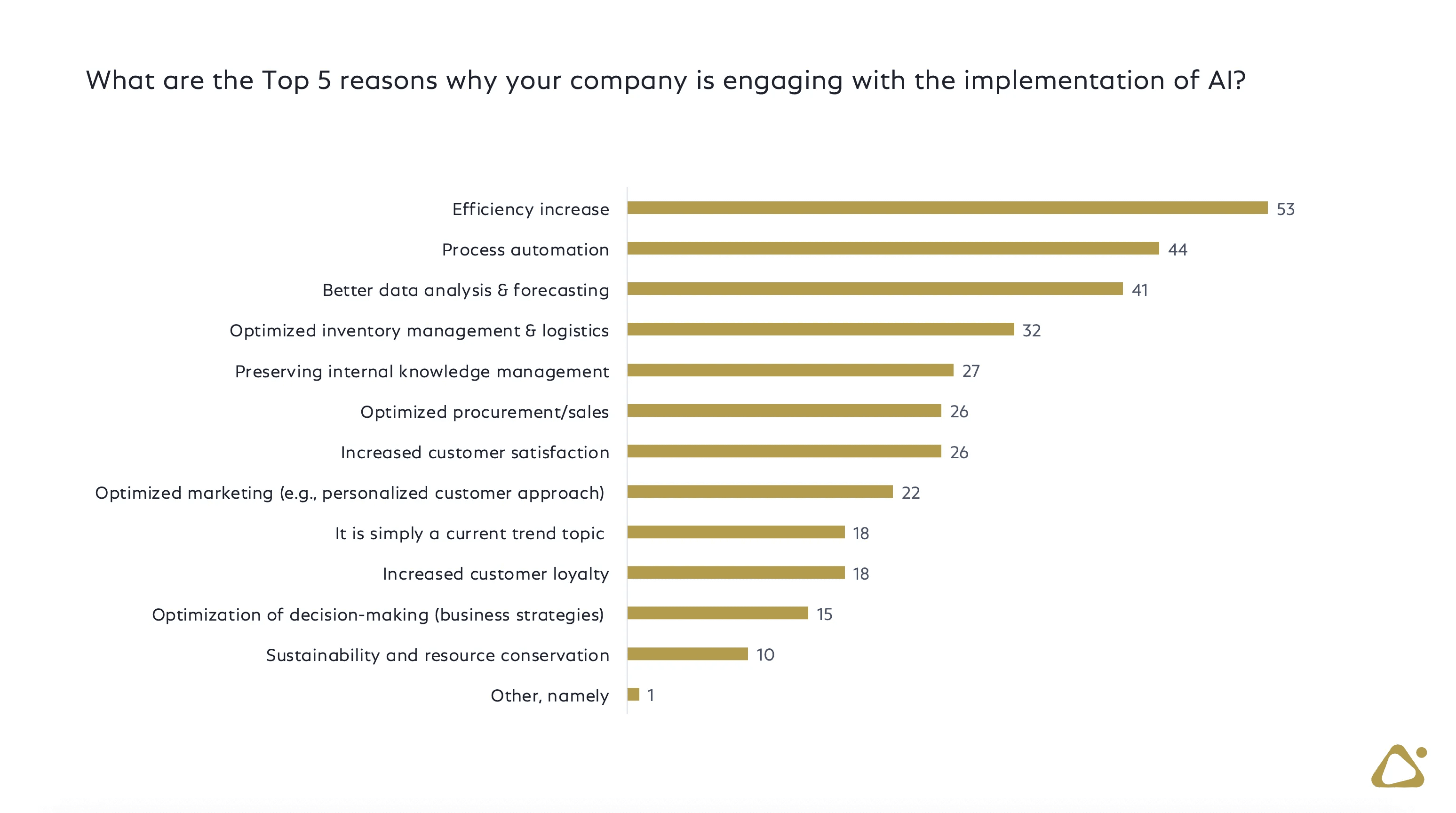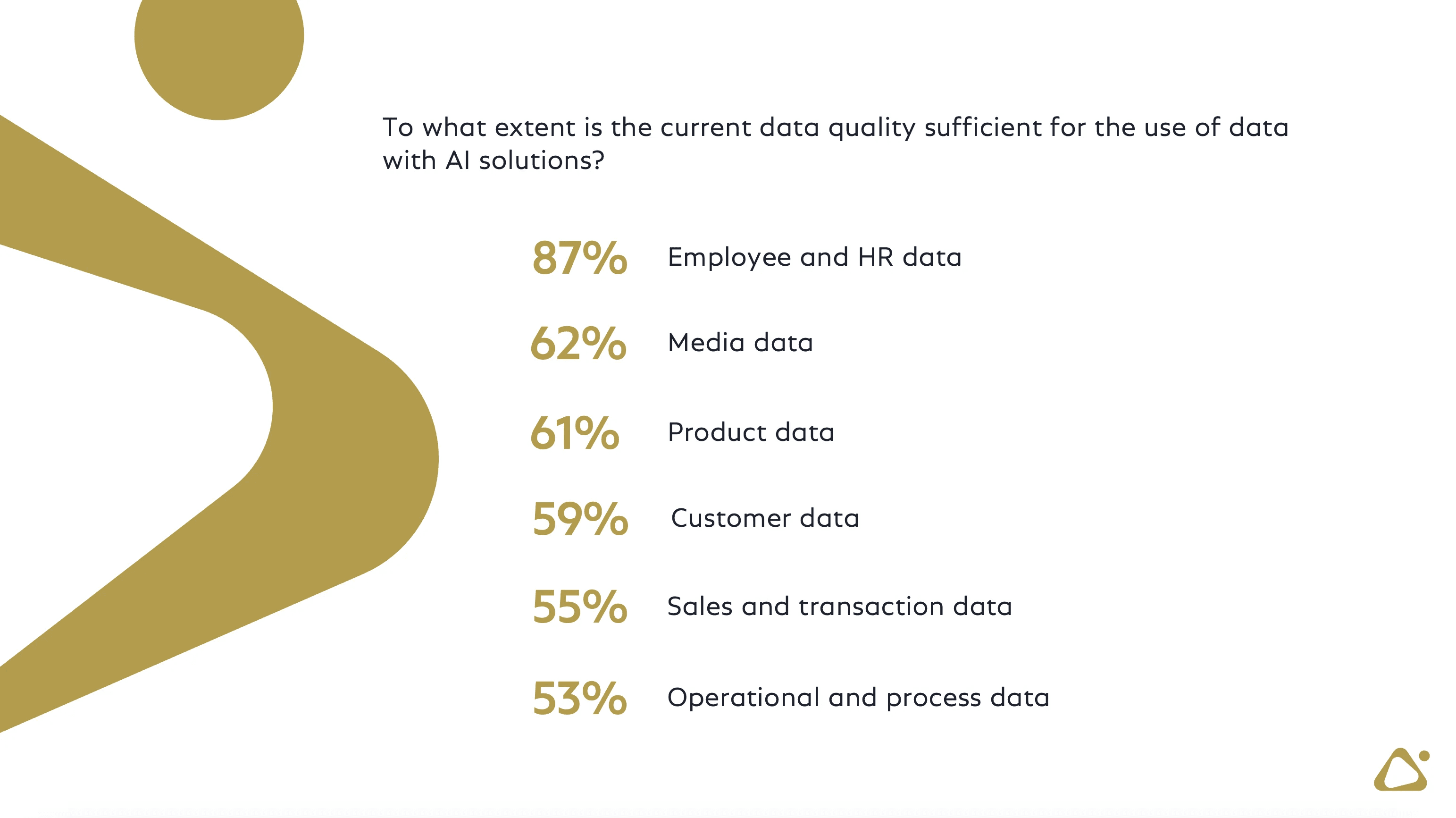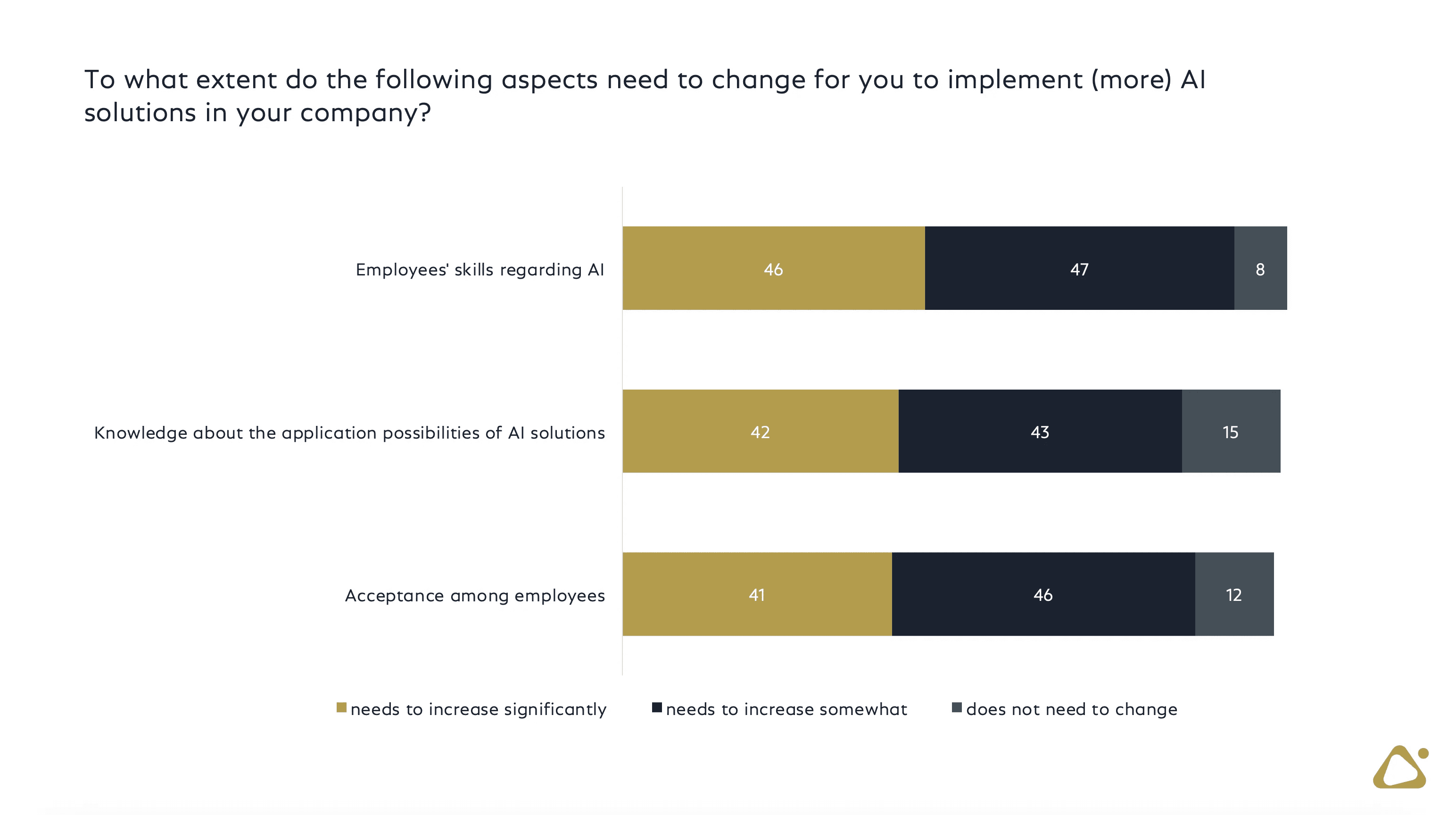
How widely is artificial intelligence already being used by manufacturers and retailers?
Which business areas are already seeing practical applications of AI, where do companies see the biggest opportunities, and what are the main challenges they face when implementing AI tools?
These are just a few of the questions explored in the ECC CLUB Study 2025, "Intelligence Rising 5." In February 2025, the study surveyed 140 manufacturers, wholesalers, and retailers—each with at least 100 employees and an annual turnover of more than two million euros. Below, we’ve summarized and contextualized the key findings for you.
AI adoption is growing – But many opportunities remain untapped
The majority of surveyed companies (82%) are actively working on implementing AI. Only 18% said they haven’t yet engaged with the topic. The main reasons for this hesitation include a lack of time (or low prioritization), concerns about implementation complexity, and uncertainty about practical use cases.
Among those already exploring AI, the top drivers are increased efficiency (53%), process automation (44%), and improved data analysis and forecasting (41%).
Interestingly, the extent of AI adoption varies significantly by department. While areas like IT security and logistics have seen relatively advanced implementations, functions with a strong customer focus - as well as finance and HR - are still lagging behind.
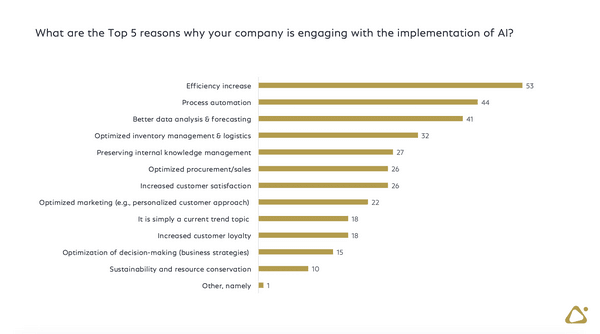
Looking at specific use cases across different business functions, it quickly becomes clear that the range of potential AI applications is incredibly diverse. In logistics and production, for example, route planning using AI and robotics—such as for inventory tasks or in manufacturing—is already quite common. In areas like marketing or HR, intelligent solutions often take the form of chatbots, virtual assistants, or predictive analytics used for sales forecasting and shopping basket predictions.
Among the less widespread use cases in logistics and production, AI-powered automated document generation and delivery time optimization stand out as particularly promising.

Data readiness and mindset: The key challenges
Awareness of AI’s importance - and interest in its practical use - has grown significantly in recent years. Still, manufacturers and retailers often run into two major roadblocks when implementing AI solutions: a lack of high-quality, accessible data, and a shortage of skilled professionals.
No data, no value
Data is the foundation of any AI solution. When asked about the top three data-related challenges in AI implementation, 31% of companies cited the integration of data into existing systems. This was followed by poor data quality (21%) and the fragmentation of data into different types and silos (18%). Interestingly, only 10% mentioned a lack of data itself as a major hurdle - suggesting that most companies already have the data they need. The real challenge lies in making that data systematically available, centrally accessible, and of sufficient quality.
This requires more than just a centralized data platform - it calls for a unified data strategy.
As a certified Microsoft Solution Partner, we’re here to help you design a future-proof solution that consolidates your data, streamlines your processes, and empowers smarter, data-driven decisions.
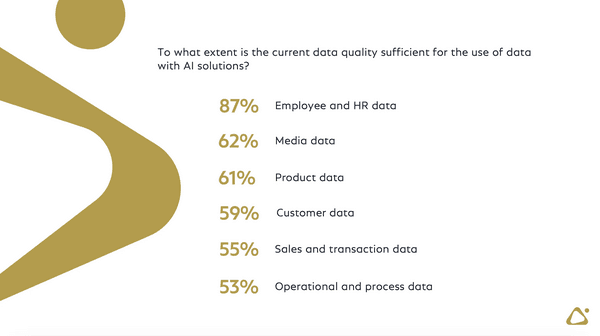
Data privacy concerns still hold many back
Data protection - and the uncertainty surrounding it - remains a major barrier for many companies. AI usage is subject to strict European data protection regulations. However, in practice, many organizations lack the experience and clarity needed to confidently apply these rules. Often, they simply don’t know what data they’re allowed to use - and how.
Skills shortages: A key obstacle
Beyond centralized access to high-quality data, many of the surveyed companies cited a lack of internal expertise and employee acceptance as major hurdles. When asked about the top three challenges related to employees and company mindset, 35% pointed to a shortage of skilled professionals as the biggest issue in AI implementation. An additional 27% cited a lack of trust or scepticism among employees, as well as insufficient know-how.
Clearly, building AI skills across the workforce is one of the most critical hurdles. After all, effective AI usage hinges on employees being able to work with these systems and interpret the data correctly. Yet in many organizations, structured training programs to develop these skills are still lacking.

Starting the AI journey right – strategic foundations for success
While a small portion of manufacturers and retailers remain cautious about adopting AI, the vast majority are already exploring or actively implementing it. AI has evolved far beyond being a buzzword - it's becoming a key pillar of modern business strategy.
Many companies have already tapped into the potential of AI in traditionally data-driven areas like production and logistics. However, there’s still considerable untapped potential in customer-facing functions like marketing and sales. AI-powered systems can automate and streamline processes, boosting efficiency - without necessarily leading to workforce reductions. In fact, AI often frees up valuable time, allowing employees to focus on more strategic tasks. At the same time, intelligent analytics enable personalized customer experiences, accurate market forecasts, and highly targeted marketing campaigns. The result? Stronger customer satisfaction and loyalty.
Source: ECC CLUB Studie 2025 (only available in German, click here to download the survey)
More similar blogposts:
Found what you were looking for?
Start your intelligent search now
